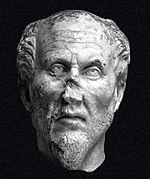 |
| History of Western philosophy |
|---|
Western philosophy
|
| See also |
| Religious philosophy Eastern philosophy |
This page lists some links to ancient philosophy. In Western philosophy, the spread of Christianity through the Roman Empire marked the ending of Hellenistic philosophy and ushered in the beginnings of Medieval philosophy, whereas in Eastern philosophy, the spread of Islam through the Arab Empire marked the end of Old Iranian philosophy and ushered in the beginnings of early Islamic philosophy.
- Ancient Greek philosophy

Graphical relationship among the various pre-socratic philosophers and thinkers; red arrows indicate a relationship of opposition.
Philosophers
Pre-Socratic philosophers
Milesian School-- Thales (624 BC–ca. 546 BC)
-- Anaximander (610-546 BC)
-- Anaximenes of Miletus (c. 585-c. 525 BC)
Pythagoreans
-- Pythagoras (582-496 BC)
-- Philolaus (470-380 BC)
-- Alcmaeon of Croton
-- Archytas (428-347 BC)
Heraclitus (535-475 BC)
Eleatic School
-- Xenophanes (570-470 BC)
-- Parmenides (510-440 BC)
-- Zeno of Elea (490-430 BC)
-- Melissus of Samos (c 470 BC–unknown)
Pluralists
-- Empedocles (490-430 BC)
-- Anaxagoras (500-428 BC)
Atomists
-- Leucippus (first half of 5th century BC)
-- Democritus (460-370 BC)
-- Metrodorus of Chios (4th century BC)
Pherecydes of Syros (6th century BC)
Sophists
- Protagoras (490-420 BC)
- Gorgias (487-376 BC)
- Antiphon (480-411 BC)
- Prodicus (465/450-after 399 BC)
- Hippias (middle of the 5th century BC)
- Thrasymachus (459-400 BC)
- Callicles
- Critias
- Lycophron
Classical Greek philosophers
Socrates (469-399 BC)Euclid of Megara (450-380 BC)
- Antisthenes (445-360 BC)
- Aristippus (435-356 BC)
- Plato (428-347 BC)
- Speusippus (407-339 BC)
- Diogenes of Sinope (400-325 BC)
- Xenocrates (396-314 BC)
- Aristotle (384-322 BC)
- Stilpo (380-300 BC)
- Theophrastus (370-288 BC)
Hellenistic philosophy
- Pyrrho (365-275 BC)
- Epicurus (341-270 BC), see: Epicureanism
- Metrodorus of Lampsacus (the younger) (331–278 BC)
- Zeno of Citium (333-263 BC)
- Cleanthes (331-232 BC)
- Timon (320-230 BC)
- Arcesilaus (316-232 BC)
- Menippus (3rd century BC)
- Archimedes (c. 287-212 BC)
- Chrysippus (280-207 BC)
- Carneades (214-129 BC)
- Clitomachus (187-109 BC)
- Metrodorus of Stratonicea (late 2nd century BC)
- Philo of Larissa (160-80 BC)
- Posidonius (135-51 BC)
- Antiochus of Ascalon (130-68 BC)
- Aenesidemus (1st century BC)
- Philo of Alexandria (30 BC–45 AD)
- Agrippa (1st century AD)
Hellenistic schools of thought
Roman philosophy
Philosophers during Roman times
Cicero (106-43 BC)
Lucretius (94-55 BC)
- Seneca (4 BC–65 AD)
- Paul of Tarsus (c. 5 AD-c. 67 AD)
- Musonius Rufus (30 AD–100 AD)
- Plutarch (45-120 AD)
- Epictetus (55-135 AD)
- Marcus Aurelius (121-180 AD)
- Clement of Alexandria (150-215 AD)
- Alcinous (philosopher) (2nd century AD)
- Sextus Empiricus (3rd century AD)
- Alexander of Aphrodisias (3rd century AD)
- Ammonius Saccas (3rd century AD)
- Plotinus (205-270 AD)
- Porphyry (232-304 AD)
- Iamblichus (242-327 AD)
- Themistius (317-388 AD)
- Augustine of Hippo (354-430 AD)
- Proclus (411-485 AD)
- Damascius (462-540 AD)
- Boethius (472-524 AD)
- Simplicius of Cilicia (490-560 AD)
- Philoponus of Alexandria (490-570 AD)
References
- ^ Lo, Ping-cheung (1999), Confucian Ethic of Death with Dignity and Its Contemporary Relevance, Society of Christian Ethics, http://arts.hkbu.edu.hk/~pclo/e5.pdf
- ^ "Zou Yan". Encyclopædia Britannica. http://www.britannica.com/EBchecked/topic/607826/Zou-Yan. Retrieved 1 March 2011.
- ^ a b Deutsch, Eliot; Ronald Bontekoei (1999). A companion to world philosophies. Wiley Blackwell. p. 183.
- ^ The significance of Purusha Sukta in Daily Invocations by Swami Krishnananda
- ^ P. 285 Indian sociology through Ghurye, a dictionary By S. Devadas Pillai
- ^ Philip G. Kreyenbroek: "Morals and Society in Zoroastrian Philosophy" in "Persian Philosophy". Companion Encyclopedia of Asian Philosophy: Brian Carr and Indira Mahalingam. Routledge, 2009.
- ^ Mary Boyce: "The Origins of Zoroastrian Philosophy" in "Persian Philosophy". Companion Encyclopedia of Asian Philosophy: Brian Carr and Indira Mahalingam. Routledge, 2009.
- ^ An Anthology of Philosophy in Persia. From Zoroaster to 'Umar Khayyam. S. H. Nasr & M. Aminrazavi. I. B. Tauris Publishers, London & New York, 2008. ISBN 978-1845115418.
- ^ Zurvan. A Zoroastrian Dilemma. Robert Charles Zaehner. Biblo and Tannen, 1972. ISBN 0-8196-0280-9.
- ^ Sasanian Iran - intellectual life. A. Tafazzoli and A. L. Khromov in: History of Civilizations of Central Asia: The Crossroads of Civilization. B. A. Litvinsky, Zhang Guand-Da, R. Shabani Samghabadi. Unesco, 1996. ISBN-10: 9231032119.
- ^ Sasanian Iran - intellectual life. A. Tafazzoli and A. L. Khromov in: History of Civilizations of Central Asia: The Crossroads of Civilization. B. A. Litvinsky, Zhang Guand-Da, R. Shabani Samghabadi. Unesco, 1996. ISBN-10: 9231032119.
- ^ Mansour Shaki. Falsafa. Philosophy in the pre-Islamic period. Encyclopaedia Iranica. Volume IX. 1999. ISBN 0-933273-35-5.
- ^ Prods Oktor Skjaervo. Bardesanes. Encyclopaedia Iranica. Volume III. Fasc. 7-8. ISBN 0-7100-9121-4.
- ^ David A. Scott. Manichaean Views of Buddhism in: History of Religions. Vol. 25, No. 2, Nov. 1985. University of Chicago Press.
- ^ Yarshater, Ehsan. 1983. The Cambridge history of Iran, volume 2. p.995-997
[edit] External links
View page ratings
Rate this page
Saved successfully
Your ratings have not been submitted yet
Your ratings have expired
Thanks! Your ratings have been saved.
Thanks! Your ratings have been saved.
An account will help you track your edits, get involved in discussions, and be a part of the community.
or
Thanks! Your ratings have been saved.







No comments:
Post a Comment